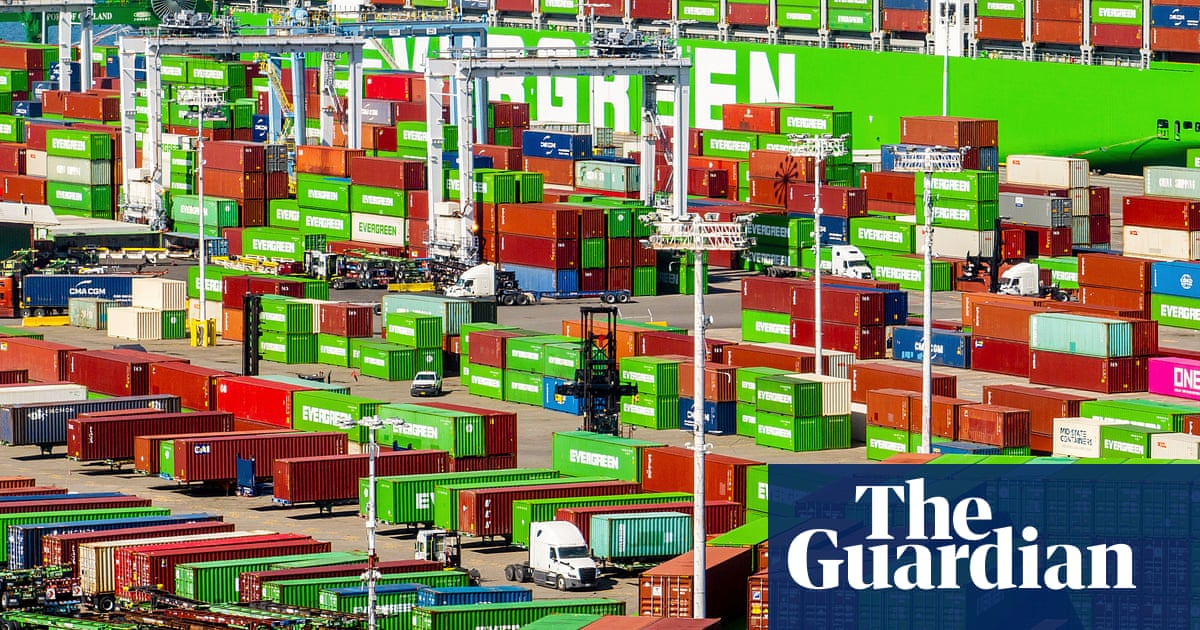Trump’s Tariff Blitz: Economic Independence or a Road to Recession?
A deep dive into the potential impacts of president Trump’s sweeping new tariffs on the U.S. economy and global trade, eight years after his first term.
A Declaration of Economic Independence?
In a move echoing the spirit of revolution,President Donald Trump,in April 2025,unveiled a important overhaul of U.S. trade policy, instantly sending ripples of concern throughout global markets. His announcement, featuring tariffs ranging from 10% to a staggering 50% on goods from U.S. trading partners, triggered a sharp decline in stock markets. This action was framed by the President as a “declaration of economic independence,” drawing immediate comparisons to Brexit and underscoring the potential for a seismic shift in international trade relations.
“No one shoudl have been surprised,” the President stated, defending his long-held vision of reshaping the global economic order.
A Consistent Vision, Decades in the Making
Trump’s commitment to tariffs isn’t a recent advancement. “I’ve been talking about it for 40 years,” he remarked, highlighting a consistent theme throughout his career. This long-standing advocacy, dating back to his days as a real estate mogul, reflects a deep-seated belief in the power of tariffs to reshape the American economy.
As far back as 1987, Trump articulated his vision in full-page newspaper ads, arguing that other major economies were the “greatest profit machines ever created.” His proposed solution then, as now, was to “‘Tax’ these wealthy nations, not America.”
Dissenting Voices: Economists, Businesses, and Politicians Weigh In
Despite the President’s conviction, his trade plan faces significant opposition. Many businesses, economists, and politicians view the tariffs as misguided, potentially harmful, and fraught wiht risk. Concerns range from the potential for retaliatory measures to the impact on American consumers.
Larry Sabato, director of the Center for Politics at the University of Virginia, observed, “This is so unusual for Trump. He’s a conventional politician in one way: he doesn’t believe in much deeply. Tariffs are different. This one thing, he seems to deeply believe in.”
From Campaign Promise to Policy Reality
Trump’s promise to revitalize the U.S. economy through tariffs was a cornerstone of his re-election campaign.He argued that tariffs would unshackle American businesses, revitalize industrial heartlands, and generate significant revenue for the federal government. However, the initial steps of his second administration were perceived as more cautious and targeted, focusing primarily on countries like china, Canada, and Mexico.
While tariffs on steel and aluminum were implemented, the broader trade agenda was often characterized by threats and negotiations. On Wednesday, dubbed “liberation day” by Trump and his aides, he sought to solidify his vision by imposing the universal and “reciprocal” tariffs he pledged during his campaign.
The Historical Debate: Echoes of Smoot-Hawley?
Trump’s historical outlook on tariffs also faces scrutiny. He argued that the Great Depression could have been avoided had the U.S. maintained a strong tariff policy. “It would have never happened if they had stayed with the tariff policy,” he claimed. “It would have been a much different story.”
However, historians strongly disagree with this assessment. Andrew Cohen, professor of history in the Maxwell School at Syracuse University, stated, “It’s what we would call a lie. False. Not true. He’s wrong. No one thinks that. even conservative economists don’t think that.Even protectionist economists don’t think that.”
The smoot-Hawley Tariff Act of 1930, which raised tariffs on numerous imports, is widely regarded as having exacerbated the Great Depression. The concern is that Trump’s policies could inadvertently repeat this historical mistake.
Economic Forecasts: A Golden Age or Economic Disruption?
The Trump administration forecasts a new era of prosperity, with millions of new jobs, increased exports, and significant tariff revenues. Though, skepticism remains high outside the administration.
Eswar Prasad, professor of trade policy at Cornell University and a former official at the International Monetary Fund, argues that “The Trump tariffs mark a liberation from the benefits of free trade for American businesses and consumers.” he predicts that the tariffs will be “severely disruptive to the US economy, with the effects felt by American consumers and businesses in practically every industry.”
A key point of contention is who ultimately bears the cost of tariffs. While the administration suggests that foreign countries will pay, economists argue that import tariffs are primarily paid by domestic companies and consumers.
The Yale Budget Lab estimates that Trump’s tariffs will increase the average U.S. household’s costs by $3,800.
Jeremy Horpedahl, adjunct scholar at the libertarian Cato Institute, warns that “These tariff increases are likely to be some of the biggest tax increases in US history and will result (if fully implemented) in some of the highest tariff rates the US has ever seen.”
Potential Impacts on Key U.S. Industries
The impact of these tariffs will likely vary across different sectors of the U.S.economy. Here’s a potential breakdown:
| Industry | Potential Impact | Example |
|---|---|---|
| Automotive | Increased costs for imported parts, potentially leading to higher car prices for consumers. | Ford,General Motors,tesla |
| Retail | Higher prices on imported goods,impacting consumer spending and potentially leading to inflation. | walmart, Target, Amazon |
| Agriculture | Potential for retaliatory tariffs from trading partners, impacting exports of U.S. agricultural products. | soybean farmers in the Midwest |
| Technology | Increased costs for imported components, impacting the competitiveness of U.S.tech companies. | Apple, Google, Microsoft |
The Future of U.S. Trade: A Fork in the Road
President Trump’s sweeping tariff policies represent a significant gamble with the U.S. economy. If his vision proves correct, it could lead to a revitalization of American manufacturing and a new era of prosperity. However, if the critics are right, the tariffs could trigger a recession, harm American consumers, and destabilize the global economy. Only time will tell which path the U.S. will ultimately follow.
What are teh potential costs associated with the tariffs, and how might they affect everyday Americans?
trump’s Tariff Blitz: An Interview with Dr. Eleanor Vance
Introduction
Welcome to Archyde.com. Today, we’re delving into the potential ramifications of President Trump’s new tariff policies. Joining us is Dr.Eleanor Vance, a leading economist specializing in international trade, to help us understand what thes tariffs could mean for the US economy. Dr. Vance, welcome.
Understanding the Tariffs
Archyde: Dr. Vance, President Trump has framed these tariffs as a bold declaration of economic independence. From an economic standpoint, what’s your initial assessment of these sweeping changes?
Dr. Vance: Thank you for having me. The immediate reaction is one of concern. Implementing tariffs on such a large scale risks significant disruption to global supply chains. While the administration aims to protect American industries, the potential for retaliatory measures from affected countries is a very real threat, possibly leading to an economic slowdown.
Past Context and Potential Impacts
Archyde: As alluded to in the opening article, President Trump has cited historical examples, even mentioning the Smoot-Hawley Tariff act.Do you see any parallels between these events, or potential pitfalls?
Dr. Vance: The comparison to Smoot-Hawley is a major point of contention among economists. That legislation is widely considered to have worsened the Great Depression by significantly raising tariffs.The concern is that similar policies, in today’s interdependent global economy, could trigger negative chain reactions. we have to remember the potential impacts that could be felt by businesses in the automotive, retail, agriculture, and technology sectors. these crucial sectors will likely be heavily affected.
Weighing the Economic Forecasts
Archyde: The administration predicts a positive outcome, anticipating job growth and increased revenue. But in your expert opinion, with what is known already, is this a likely scenario? What are the key dissenting points of view from economists?
Dr. Vance: The economic forecasts are mixed, but skepticism outside of the administration is high. Most economists believe that the costs of these tariffs are likely to be borne by American consumers and businesses, leading to higher prices and possibly reduced spending. The yale Budget Lab estimates significant cost increases for the average household, which is a worrying trend.
Looking Ahead: A Path Forward?
Archyde: Dr. Vance, if these tariffs were implemented, what measures or strategies could potentially mitigate the negative effects and help foster a better outcome?
Dr.Vance: The biggest need is for clear and consistent communication from the administration about the goals and expected outcomes of these tariffs. Additionally, there needs to be active engagement with trading partners to prevent retaliatory measures and explore option solutions. we should really focus on supporting industries, helping them cope with the impacts. Finding domestic providers or reducing operational costs may be key in supporting American businesses.
Conclusion
Archyde: Thank you, Dr. Vance, for providing us with your expertise. It seems that,as we’ve discussed,President Trump’s new tariff policies present a pivotal moment for the U.S. economy. What do you think – is this a time of opportunity or potential crisis? We invite our readers to share their opinions and start a discussion. Please leave your thoughts in the comments below.








